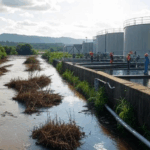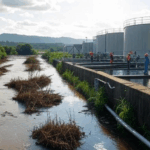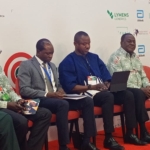
The Ghana Water Company Limited (GWCL) has raised concerns about the growing siltation of its major water treatment plants across several regions, blaming illegal mining and other human activities for the threat to sustainable water supply.
According to the Managing Director of the company, Mr Adam Mutawakilu, the situation is particularly severe in the Ashanti, Eastern, Central, and Western Regions. He said the company has launched a 24-month recovery plan to protect treatment facilities and restore affected water bodies.
Mr Mutawakilu explained that the increasing silt levels in rivers and dams have significantly raised the cost of water treatment, placing immense pressure on the company’s finances. He disclosed that the company will require about GH₵300 million to desilt treatment plants across the country.
“The siltation of these plants has serious consequences for all sectors. Food processing and fast-moving consumer goods companies will face drastic reduction cycles and quality incidents. Hotels, restaurants, and events will struggle with unreliable supply and expensive backups.”
He added that the effects would also be felt in public services and industries. “Hospitals and schools will be fenced into water scarcity with obvious hygiene and service risks. Manufacturers will face processing interruptions, and the real estate and commercial sectors will absorb rising costs for backup water and energy,” he said.
Mr Mutawakilu said that when treated water becomes expensive and less reliable, the impact is felt throughout the economy.
“Productivity falls and prices rise when a fundamental input, treated water, becomes more expensive and less reliable,” he said.
He called for stronger collaboration among state agencies, local authorities, and the private sector to address the issue.
“We need the support of corporate Ghana and development partners to match Ghana Water Limited’s investment,” he said.
“We will work closely with the Water Resources Commission, Environmental Protection Agency, Minerals Commission, Ghana Gold Board, National Security, and the district assemblies to align enforcement and protect buffer zones.”
He noted that the company will also engage traditional authorities and community leaders to promote environmental protection and sustainable water management.
“We need their support, either in kind or through finances, materials, equipment, and logistics assigned to specific leaders. Each contribution will be visible, measurable, and auditable,” he added.
While acknowledging government efforts to curb illegal mining, Mr Mutawakilu downplayed calls for the President to declare a state of emergency on the matter. He argued that such a move would not provide a lasting solution.
“What measures can we put in place for it to be sustained? Is the state of emergency going to be there forever? We cannot stay in a state of emergency forever. There must be pragmatic measures to make sure that what we put in place can be sustained.”
He also pointed out that illegal mining is not the only cause of siltation in Ghana’s rivers, but sandwinning as well. “It is not only illegal mining that silts our treatment plants,” he said.
- President Commissions 36.5 Million Dollars Hospital In The Tain District
- You Will Not Go Free For Killing An Hard Working MP – Akufo-Addo To MP’s Killer
- I Will Lead You To Victory – Ato Forson Assures NDC Supporters
Visit Our Social Media for More




